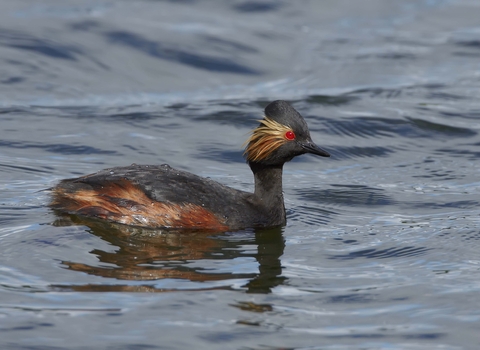
©Richard Steel/2020VISION
Black-necked grebe
Known in America as the 'Eared Grebe' because of its golden ear tufts, the black-necked grebe is a rare nesting bird in the UK. It is easiest to spot around southern coasts in winter.
Scientific name
Podiceps nigricollisWhen to see
January to DecemberSpecies information
Category
Statistics
Length: 31cmWeight: 260-360g
Wingspan: 58cm
Average lifespan: est. 7 years
Classified in the UK as Amber under the Birds of Conservation Concern 5: the Red List for Birds (2021). Protected in the UK under the Wildlife and Countryside Act, 1981.
